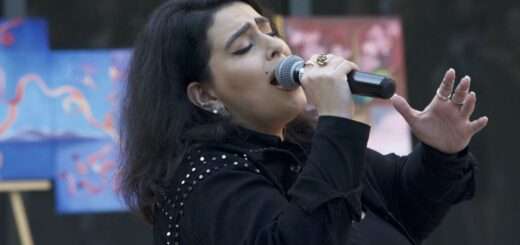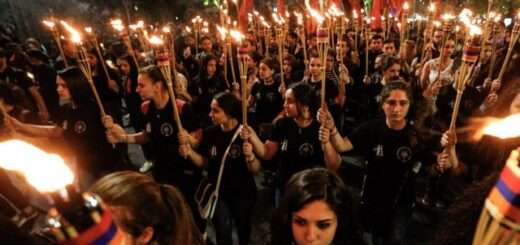Donations Tilt Vatican In Favor of Azerbaijan —- By Harut Sassounian

In a lengthy article published in the Irpmedia.irpi.eu in Italian on March 27, 2024, titled, “How Vatican helped legitimize the Aliyev autocracy in Azerbaijan,” Simone Zoppellaro exposes Vatican’s pro-Azerbaijan tilt due to financial donations, despite Armenia being a Christian nation, while Azerbaijan is Islamic.
On Feb. 22, 2020, the autocratic leader of Azerbaijan Ilham Aliyev, and his wife, Mehriban Aliyeva, the country’s Vice President, paid a state visit to the Vatican. They were received officially by Pope Francis, Secretary of State Cardinal Pietro Parolin, and Secretary for Relations with States Archbishop Paul Richard Gallagher. Mrs. Aliyeva was at the Vatican to receive the highest honor awarded to a lay person by the Holy See: “The Grand Cross.” The award is proposed by the Diocesan Bishops “as a sign of appreciation and gratitude for services to the Church or to society reserved for Heads of State, ministers, ambassadors, and royalty.” However, the driving force behind Vatican’s interest in Azerbaijan is the financial support provided by the Heydar Aliyev Foundation.
Ironically, despite Azerbaijan’s intolerance of minorities, dissidents and other religions, the Holy See expressed its appreciation to “Azerbaijan’s openness and peaceful attitude towards different faiths.”
Fearing the loss of Azerbaijan’s donations, the Vatican has been reluctant to allow any criticism of Baku, particularly by its own clergy. “Father Georges-Henri Russyen was expelled from the Pontifical Oriental Institute because he was critical of those who did not want to use the formula ‘Armenian genocide.’”
Given the expectations of benefiting from Azerbaijan’s “Caviar Diplomacy,” the Vatican has not been willing to say anything more substantial than emphasizing “the importance of intercultural and inter-religious dialog in favor of peaceful coexistence among different religious and ethnic groups,” meaning Armenians and Azeris. The Pope prayed for the inhabitants of Karabakh, hoping “that the talks between the parties, with the support of the international community, will foster a lasting agreement that will end the humanitarian crisis,” Even during the 2020 War, “the Church was unable of going beyond generic appeals for moderation ‘to all the parties involved and to the international community’ to ‘lay down their weapons.’”
On October 24, 2023, Prime Minister Nikol Pahinyan received from the Apostolic Nuncio José Avelino Bettencourt the same award given three years earlier to Aliyeva, Azerbaijan’s Vice President. However, there was a major difference. While Aliyeva received her award directly from the Pope, Pashinyan was honored by an Apostolic Nuncio. There were also other differences which “helped consolidate the power of the Aliyev family, despite human rights violations in Artsakh.”
“Cardinal Gianfranco Ravasi, honorary president emeritus of the Pontifical Council for Culture and chairman of the Pontifical Commission for Sacred Archaeology, is the highest Vatican official who has made the most efforts to open a dialog with Azerbaijan.” He was awarded the Order of Friendship in 2013 by the Azerbaijani authorities — a high honor offered for a “special contribution to the development of friendly, economic and cultural relations between Azerbaijan and a foreign state.”
Cardinal Claudio Gugerotti is considered “the protagonist of the privileged channel” established between the Vatican and Baku. “Highly educated and polyglot, ambitious and lover of power, Cardinal Gugerotti has known the Aliyev family since 2002, when Pres. Heydar Aliyev, in power since 1969, was still alive.”
“In the early 2000s, Gugerotti met with the Azerbaijani authorities as Nuncio for the Southern Caucasus, a position he assumed in 2001. Before then this nunciature for the Holy See included only Georgia and Armenia. Those were the years in which Russia guaranteed a ceasefire in the region, after Armenia had defeated Azerbaijan in the first conflict. The ethnic hatred that is still fuel for the conflict was beginning to settle, but Nuncio Gugerotti called Azerbaijan a ‘country [that] is a symbol of peaceful coexistence between people of different religions.’”
“Ten years after he began his mission as Apostolic Nuncio in 2011, Gugerotti signed the historic agreement which, for the first time, regulated relations between Baku and the Catholic Church. At the time of ratification, recalls a 2019 book produced by the Foundation for the Promotion of Moral Values from Baku entitled ‘Christianity in Azerbaijan,’ Gugerotti expressed gratitude to the (Azeri) government for creating the conditions that made possible [the agreement], emphasizing that our country always remained committed to the principles of tolerance, and noting that the agreement was the first document of its kind, because the Vatican had never signed such an agreement with any state before.”
According to Gugerotti, “Azerbaijan has once again demonstrated its tolerance. Now the whole world is witnessing it. I am sure that this document will receive a positive response in the international world and will be remembered as a great historical event. The reaction of the press from day one proves us right. On behalf of the Holy Throne and the Crown, I extend my deep thanks for all this to President Ilham Aliyev and the Government of Azerbaijan.”
Since 2009, the Heydar Aliyev Foundation, headed by Mehriban Aliyeva, has funded various activities in the Vatican: restoration projects, exhibitions and concerts. Other projects funded by Azerbaijan included: the Roman catacombs, the Vatican Museums, the Vatican Apostolic Library, and Catholic churches in France and Azerbaijan. These donations amount to one million euros.
In 2013, Gugerotti received the Movses Khorenatsi Medal — the highest Armenian honor — from the then president Serzh Sargsyan for his important contribution to Armenian studies, but also the effort aimed at strengthening relations between Yerevan and the Holy See.
The author of the article concluded that the close relationship between the Vatican and Azerbaijan has had the effect, perhaps unintended, of strengthening the hegemonic role of the Azeri autocracy… which may contribute to a diplomatic normalization that would put in the background, or erase, crimes and aggressions committed by the Azeri autocracy.








It does not surprise me. The Pope now supports gay marriage, why shouldn’t he show support for a, predominantly, Muslim country that has persecuted its Orthodox Christian minority for decades. The Vatican is easily bought. I feel sorry for Armenian Catholics.